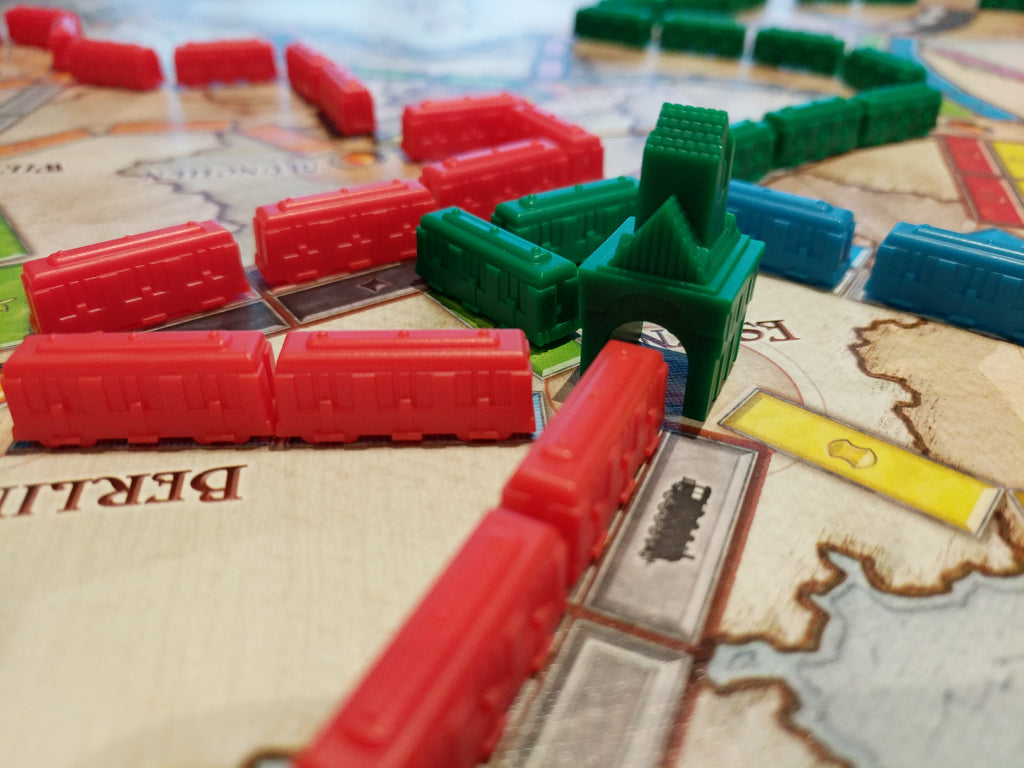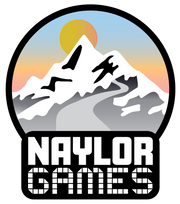Note: If you’ve not played a Ticket to Ride game before, I recommend that you play Ticket to Ride: Europe first before reading. I'll be taking a lot of knowledge of the game for granted.
I first discovered
Ticket to Ride: Europe in 2008. It was not the first hobby game that I played, nor even the first train themed one; that honour goes to
Martin Wallace's excellent Railroad Tycoon. But TtR: Europe's fantastic qualities were clear from the beginning.
Simple enough to play with non hobbyists but challenging enough to keep even strategy game enthusiasts occupied, it was obviously a 'gateway game' before I learned the term.
Since then, I've played lots of the different expansions and alternate base games in the series. But none of them has quite managed to equal this title for me. It's the one I find myself consistently drawn back to; either because of it's popularity with other people (I've seen it as the version of choice in several office collections, for instance) or because it's the one I'll nearly always pick when choosing between sister titles.
You could put that down sentimental attachment - it was my first after all! But I'm clearly not the only one,
just look at its BGG rank. What is the draw?
Just a lot of good stuff?
The game is clearly a well rounded addition; having quite a few appealing features that set it apart from other titles in the series. A potential theory is that it's just a "perfect storm" of really well executed little additions to the original game. Does that stack-up?
Tunnels
A small, but well executed little feature that brings some entry-level game tension.
I haven't played enough games, or analysed the destination tickets enough to understand how important it is that the
particular shorter links are relatively harder than they would otherwise be. But the whole idea that building the link is
itself a risk unless you really hedge your bets, does create a kind of tension absent from TtR in general. Players individually are pretty tense about their own ticket completion but they necessarily have to keep a poker face about it. The moment where you have to flip cards to see if you tunnel is successfully built, however, creates a little group experience that is somewhat akin to the tension before a crucial dice role or card draw in other games.
On the other hand, this is almost never a particularly engrossing,
high stakes moment precisely because it can be hedged by other cards. It's also unlikely to be a game decider. I've never once witnessed a game that turned on such an outcome, though I'd be keen to hear if anyone has.
Train ferries
Not too much to say here. They add some challenge and they make locomotives marginally more important, but - unless I'm missing something big - the additional game variety is basic and not that dissimilar to the function of grey routes.
Long routes
Just having longer routes at the opening is an interesting feature because it gives you a more epic mission to complete at the outset if you so choose it (which you likely will given the allure of the points). But by the same token the long routes would be quite precarious to take without the availability of stations. It has one other small benefit that makes the game friendly to new players. By having one long, high scoring route, it gives them some clearer initial direction. It is easier for them to choose their long route and a matching short one than have to triangulate between different combinations of medium or short routes.
The board layout itself
The Europe map is itself very good. There's a strong variety of different spaces to operate in and each area has a good array of simple things to do: Eastern Europe, for instance, feels distinct from Western Europe as does Turkey / Balkans. This difference itself partly originates from the sprinkling of tunnels and train ferries around the board. There's also just enough choke points to push players towards stiff competition at crucial points in the game.
But if I am being honest, I haven't yet played a single
bad Ticket to Ride board. Many of the other expansions (even the
UK one) have similar well-balanced properties.
Undoubtedly, all these additions are good and contribute to the game, but it's unconvincing for me that even the combination of these gives this title an edge. After all, the UK map has lots of nice ideas - as does
Rails and Sails.
The stations are not just another interesting feature - they change the whole experience
In the end, it must be the stations. Their wonderfully forgiving nature doesn't just offer a bit of novelty or new strategic possibility here or there, it changes the experience of the game completely for the vast majority of the people that play it: i.e. the non-hardcore TtR fans. I'd go as far as to say, if every other minor addition was junked they would, alone, make it the strongest title.
By allowing players to use others routes as their own to complete destination tickets, they uniquely enable players to protect themselves from the suckiest part of a game of TtR - the dreaded uncompletable destination ticket.
Hardcore gamers, I am sure, would probably see this as
just tough luck. But from the average TtR players perspective, getting an uncompletable destination ticket is truly terrible. You've spent all game working towards one (or worse, more than one) ticket that relies on a specific route. The last possible route to get there goes and bang - suddenly everything falls apart. First, there's the deeply frustrating collapse of your masterplan, something only good sports genuinely handle well. This feeling usually made worse if someone blocks you cluelessly (most likely another inexperienced player). Then, as you stare at the cruelly inevitable negative points in your hand, there is soon the strong sense that you've probably lost the game. If you knew TtR really well, you know that other people may well be in the same boat. But if you don't, you're all alone. Unless you are so far ahead you can take it on the chin, you now come to believe the game can't be won. Powerlessness like that means you just start marking time until it's all over. I.e. Fun = Dead for you.
The station though, gives you a second chance. Sure, when you place it you'll lose out on your unused station bonus. But you probably don't feel like the same kind of loss anyway. Perhaps its because you
already have them to spend as
you decide. Perhaps you only dimly remember that rule about unused stations scoring at the end. You might even lose that longest line bonus, you thought you were
kind of in
with a chance of getting. But you probably don't care much about that either. The point is that you still got away with it. You secured the ticket, those brutal points are avoided and *phew* the plan is back on track!
Sure, the stations won't help you if you really have gone and f****d yourself with a truly overambitious building project. But it wouldn't be fair if they did. If you lose because you took too many spins on the "new destination ticket casino", its generally funny rather than de-motivating because you did it to yourself; there's still
justice in it. For less experienced players, stations mean all the fun of Alan R Moon's brilliant core route and destination mechanics without the demoralising downside.
But here's the really clever thing about stations: they even improve the experience of the expert players by bolstering their egos. If you're really good, you flatter yourself you don't need a station. You - clever cloggs that you are - see the 4 bonus points a pop for
not using them will quickly add-up. In a game of incremental advantage over opponents, the really canny way to avoid the horror of the uncompletable tickets is to watch where other players are going and claim critical routes early.
It's my contention that that ability to go easy on new players, while flattering and challenging experienced ones further, is the sole reason that
Ticket to Ride: Europe is the true gateway game of the series. Sure, every game in the series is relatively simple for new players to learn. But only this one keeps them coming back even if they get a bust ticket on their first journey out.
And, if it weren't impressive enough, all of this comes from a single new playing piece, carefully priced in simple victory point terms, that you place by using a mechanic you
must already understand to be playing the game at all. If that's not a simple product intervention for a huge ROI in player experience, I don't know what is.
Personally I can't think of another TtR mechanic that comes close to this level of design, but do let me know if you disagree!


Leave a comment